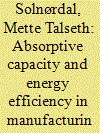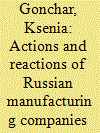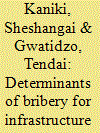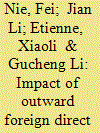|
|
|
Sort Order |
|
|
|
Items / Page
|
|
|
|
|
|
|
| Srl | Item |
| 1 |
ID:
167025


|
|
|
|
|
| Summary/Abstract |
Increased energy efficiency (EE) in manufacturing firms is important for confronting climate challenges. However, the information barrier is considered a major restriction on EE innovation. Building on the theory of absorptive capacity and the current EE literature, we argue that this barrier relates to firms' ability to assimilate and exploit information. Thus, this study's objective is to analyse firms' knowledge characteristics as determinants of EE innovation. We perform logit regressions using a Norwegian panel dataset for the period 2010–2014. The results are based on statistical correlations between data points that have potential uncertainties. Still, the main implications from our study are that prior knowledge, in terms of higher educated workforce, knowledge development, in terms of R&D capacity, and external knowledge cooperation, such as cooperation with universities and competitors, increase firms' pursuit of EE innovation. Further, the results also imply that there is an interaction effect between higher educated workforce and collaboration with universities. These results suggest that policy makers should consider firms' ability to assimilate and exploit information. This can be done by providing information according to firms' needs and absorptive capacity, and offering possibilities for firms to increase this capacity.
|
|
|
|
|
|
|
|
|
|
|
|
|
|
|
|
| 2 |
ID:
120672


|
|
|
|
|
| Publication |
2013.
|
| Summary/Abstract |
This essay explores the nature of the 2008 crisis and the channels through which it affected the performance of firms in Russia. Based on the findings of a manufacturing industry survey, the evidence suggests that all manufacturing firms were affected by the crisis and that there is no single and dominant transmission channel. Crisis reactions were significantly related to participation in international markets, although participation in trade, in external borrowing or FDI cannot explain recession by themselves. The reversal of growth was mainly caused by demand shock and, following that, by financial constraints. Thus the hypothesis that blames overheating of internal demand in the years prior to the crisis seems to receive statistical backing. Globalised companies, though hit by external shocks, were better prepared to pay the cost and balance the consequences of the crisis.
|
|
|
|
|
|
|
|
|
|
|
|
|
|
|
|
| 3 |
ID:
115209


|
|
|
|
|
| Publication |
2012.
|
| Summary/Abstract |
Existing empirical evidence suggests that corruption in infrastructure is prevalent in developing countries. Using data on manufacturing firms in Kenya, Uganda and Tanzania, this study investigates what type of firms are asked to pay bribes by public officials in order to access infrastructure. We find that firms in Tanzania and Uganda face more severe problems with infrastructure than those in Kenya. Despite facing fewer infrastructure constraints, we find that Kenyan firms are more likely to be asked for bribes than Ugandan and Tanzanian firms; suggesting that paying bribes could be enabling Kenyan firms to access limited infrastructure. We also find that larger firms are less likely to be asked for bribes, and that an efficient court system reduces the propensity of public officials to ask for bribes. In addition, firms located in capital cities are more likely to be asked for bribe payments. These findings provide policy makers with specific targets to aim for in the design of policies meant to address corruption in infrastructure provision.
|
|
|
|
|
|
|
|
|
|
|
|
|
|
|
|
| 4 |
ID:
191154


|
|
|
|
|
| Summary/Abstract |
This study examines the impact of outward foreign direct investment (OFDI) on Chinese manufacturing firms' financialization and servitization. Using a difference-in-differences approach with propensity score matching, we found that OFDI encouraged firms' financial and service activities. The effects of OFDI on financialization were stronger for firms specializing in short-term financial assets, operating in labor and technology-intensive sectors, investing overseas to pursue production, resources and markets there, and investing in non-OECD and Belt and Road Initiative (BRI) countries. Meanwhile, firms investing overseas were more likely to provide services at the sale or postsale stages. Outward foreign direct investment has also boosted the service activities of firms operating in the technology-intensive sector by investing overseas to seek resources and markets, as well as investing in non-OECD and BRI countries. Finally, OFDI partially influenced the extent of financialization and servitization of firms by affecting their profit-making ability.
|
|
|
|
|
|
|
|
|
|
|
|
|
|
|
|
|
|
|
|
|